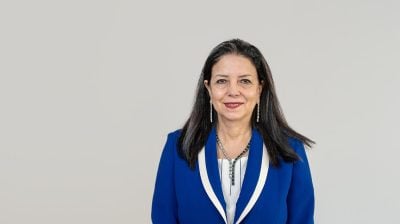This article was produced with the support of Network International

Dr. Reda Helal is the Group MD, Processing Business – Africa and Co-Head, Group Processing, leading a client-focused business unit serving financial institutions, fintechs and payment partners. Reda has been with Network since 2007 in several roles, including partnering with the KSA team to launch the company’s business in Saudi Arabia, as well as being Group Chief Sales Officer – Processing.
He is passionate about payments innovation, financial inclusion and cashless societies, with over 22 years’ experience in digital payments, strategic planning and execution, new market entries and leadership practices in multinational payments organisations. He’s also held various leadership roles in international banks across the Middle East, Africa and North America including Citibank, United Bank, and Arab Bank.
He holds a doctorate from the University of Liverpool, UK, and a Master’s degree from York University, UK.
Network International is the leading payment solutions provider in the Middle East and Africa (MEA). Its purpose is to help businesses and economies prosper by simplifying commerce and payments.
The company has built a business based on long-term partnerships; enabling over 200 financial institutions to deliver payment services to 16 million card-holding consumers and serving over 150,000 merchants.
In 2019, Network listed on the London Stock Exchange, and in 2021 it completed the acquisition of DPO Group, the leading high-growth online payments platform across Africa. It currently operates in 50 countries across the MEA region, including more than 40 African markets.
ABK: In your recent whitepaper on Digital Payments Transformation, you say we’ve reached a point where the risks of delaying upgrades to digital payments processing capabilities now outweigh the challenges for banks and financial institutions to make the shift. What should be the way forward, then?
RH: For banks / FIs with legacy systems and infrastructure, the obvious way forward is an upgrade to ‘in-house’ systems. However, an emerging business model has given them the opportunity to achieve the goals of digital payment transformation without the need for CapEx investment – Payment as a Service [PaaS].
PaaS as an alternative approach should be seriously considered as it provides a high-level understanding of the multiple cost factors associated with digital transformation; banks / FIs typically spend over $10m on a new end-to-end front-end system implementation, with external expenses accounting for 60–75% of a typical project.
Adopting this model [PaaS] warrants a closer look before taking the traditional route, keeping in mind that the risks of poor implementation, poor service and unforeseen developments need to be managed well and with a trusted partner / processor who has done it successfully before.
The lifecycle of technology maturity is shortening – PaaS allows banks and FIs to focus more on innovating their customer experiences and less on building the necessary infrastructure to accommodate a world of increasingly multichannel integration.
You acquired DPO Group, Africa’s largest e-commerce payments service provider, in 2021. How has this helped you support the needs of Africa’s evolving and expanding payments space?
Adding DPO to the Network fold has significantly strengthened our online services in terms of reach, quality, and capabilities. We are natural partners, together providing the widest range of payment acceptance options for merchants across the region, while also consolidating our exposure to the world’s fastest growing payments markets.
At the broader level, DPO has been key to translating our refreshed strategy of serving more customers (‘Accelerate’) and serving our customers better (‘Innovate’) to the African market.
Although cash is still king in Africa, many banking and non-banking players have recognised the importance of reducing friction in payments and providing new solutions to consumers and businesses.
That’s what we’re here for – to help simplify and quicken the pace of digital transformation and deliver solutions that satisfy the growing desire among people and businesses to go digital – including in making and taking payments.
What are Network International’s key drivers for revenue growth, and what lies at the heart of your growth plan?
Our growth ambition is driven by the numerous opportunities presented by the fast-moving markets we serve.
We are taking two approaches to capitalise on these opportunities: ‘Accelerate,’ which is a push to grow our customer base faster than ever before in our larger markets such as the UAE, Saudi Arabia, South Africa, and Egypt, by expediting merchant signups and securing larger financial institution outsourcing deals; and ‘Innovate,’ which directs our focus on being at the forefront of digital payments trends.

How is Africa’s digital payments sector looking in the near future?
In 2020, at the height of Covid-19, Africa’s e-payments industry generated around $24bn in revenues, of which about $5bn was domestic electronic payments. However, only 5–7% of all payment transactions in Africa were made via electronic or digital channels.
Digital payments has tremendous room for growth, especially now that we’re seeing a nascent, but surging, consumer appetite for digital and online payments, complemented by the momentum we’re seeing in the development of supporting infrastructure.
For our own business, this portends more outsourcing of payment activities by financial institutions. Our performance in Africa was less impacted by Covid-19 than in our other markets as most of our business activities here have leaned towards Issuer Solutions, which demonstrated greater resilience during the period.
Now that the African economy is pushing for a post-Covid rebound, we’re eyeing more support for the merchant / acquiring space which DPO will play a key role in.
Financial inclusion remains a huge story in Africa – more than half of the population still don’t have any form of bank account. Plus, a McKinsey report anticipates digital payments to not only endure but grow by at least 30% through 2025, so there’s a need and a huge opportunity to help reshape Africa’s fast-growing electronic payments ecosystem with solutions for consumers and businesses alike.
You’ve collaborated with Infobip to bring WhatsApp for Business banking services to financial institutions across Africa. Could you tell us more about this?
Infobip is one of the world’s largest providers of application to person (A2P) SMS services so it’s an excellent partner for us to enable our banking customers to deliver world-class support and seamless services to their customers in a personal, timely, and reliable manner, through a familiar and reliable channel, Whatsapp for Business.
For individuals, WhatsApp for Business enables them to access their money securely and quickly and benefit from the latest chatbot technology to better manage their finances.
Network International will continue to help drive digitisation through innovative products and collaborations such as this one with Infobip and work more closely with governments and financial institutions in Africa to champion financial inclusion.
Neo-banks and challenger banks have been gaining traction in Africa as of late; how do you see them impacting the continent’s economy?
Challenger banks are filling the growing need across Africa for rapidly-implementable and customer-centric digital banking technologies. They are influencing more agility and competitiveness in the sector and a sharper focus on supporting and expanding the digital economy.
Digital-first or mobile-only financial services are very appealing to a region with a mostly unbanked population, most of whom have become highly adept at using mobile devices for making financial transactions.
I am proud to share that we’ve forged collaborations with four challenger banks leading the digital transformation charge in Africa – Carbon, Kuda Bank, TymeBank and Wema Bank.
At Network, we believe in the importance of extending our technical expertise to challenger banks and work closely with them to achieve our common goal of increasing the adoption of digital payments in Africa. We will continue to apply our rich experience in payments and knowledge of the African market to support these banks in providing fresh digital banking experiences.
The highly-anticipated African Continental Free Trade Area (AfCFTA) agreement includes the establishment of a Pan-African Payment and Settlement System (PAPSS). How will this affect Africa’s payments journey?
PAPSS provides the infrastructure for payment facilitators such as banks and fintechs to enable instant and secure payments across the continent. It’s a game-changer in digitising payments and growing Africa’s digital economy.
The platform won’t just pave the way for more seamless pan-regional payments; it will also help standardise the legal and regulatory landscape to advance the AfCFTA’s broader goal of promoting intra-African trade.
As a business in transformation ourselves, Network is happy and hopeful about how the dynamics of payments are evolving and leaning more towards digital in Africa.
This is especially so as the region’s predominantly young population are increasingly engaging with financial products in different ways, ready to blaze the trail in the use of modern payment services. PAPSS sets the stage for further modernising and energising Africa’s payments narrative.
Cybercrime is estimated to cost Africa around $4bn annually. How does Network address this threat?
Safeguarding our operations and our services against fraud and other security threats is a top priority for us at Network International. Aside from our in-house fraud monitoring and risk teams, we also partner with the world’s leading fraud management developers to implement best-in-class anti-fraud systems that provide protection tailored to the needs of our organisation and our customers.
We’ve seen a dramatic transition to digital payments in Africa in the past few years, but in parallel an alarming surge in fraud as well. As the Middle East and Africa’s payments champion, we continue to anticipate, adapt, and improve on global trends and standards in fraud prevention and management. We understand the prime importance of creating powerful fraud protection and credit management solutions to help financial services providers safely grow Africa’s evolving digital economy.
How do you see your organisation a few years or even a decade from now?
There are some things that will stay the same in the coming years – we’ll maintain our passion for delivering market-leading, consumer-focused payment services, for one, and we’ll also keep on training our sights primarily on the MEA markets.
But there will also be room for faster growth, more activity beyond our home base of the UAE, and more capabilities in value-added services, among others.
I believe we’ve played an important role in the development of the economies we operate in. Moving forward, I am confident that we would have greatly fulfilled our purpose of helping businesses and economies prosper by simplifying commerce and payments.
 Sign in with Google
Sign in with Google 




